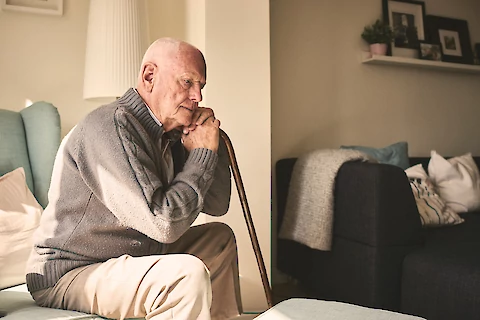
Mental health is crucial to overall wellness, especially in senior citizens. As we age, we may encounter challenges that affect our mental well-being significantly. Recognizing early signs of mental illnesses allows for timely interventions, improving the quality of life for our seniors. This blog post provides valuable knowledge and practical tools to monitor seniors' mental health effectively.
Understanding Mental Illnesses in Seniors
Mental illness is a health condition that manifests as changes in emotion, thinking, or general behavior. It may become apparent with distress or problems functioning in a work, social, or family environment.
Most people with mental illness lead normal lives. The condition of mental illness is also treatable and early detection can make a world of difference.
Mental health in seniors is a crucial topic that doesn't get the attention it deserves. Understanding the common mental illnesses among seniors begins the journey toward mental wellness. Alzheimer's, depression, and anxiety represent forms of mental illness frequently diagnosed in seniors. These conditions may dramatically affect daily activities. Remember that knowledge is power, and this better equips us to face the challenges of these conditions.
Signs and Symptoms of Mental Illnesses in Seniors
Early detection of signs and symptoms is instrumental in managing mental illnesses. However, these signs manifest differently in seniors. For instance, Alzheimer's might start with slight memory problems, difficulty completing familiar tasks, or confusion with time or place. Depression, on the other hand, may present as persistent sadness, loss of interest in once-used activities, or unusual sleeping patterns. It's vital to remember that these symptoms may vary individually.
Daily Activities for Monitoring Mental Health
Seniors may also engage in numerous daily activities to track their mental health:
- One way is to keep a journal to document feelings, thoughts, and memories, as well as any notable changes. This private vehicle of expression often serves as a tool to notice subtle changes in cognitive or emotional well-being.
- Engaging in stimulating activities such as puzzles or reading, provides valuable indicators of our mental status. If these activities become unusually challenging or cease to bring pleasure, it may indicate a mental health concern. It's important to weave these activities into seniors' daily routines for consistency.
- Participating in exercise or physical activity represents a component of good mental health. A decline in physical activity may indicate a concern about declining mental health.
When to Seek Professional Help
Recognizing when seniors need professional help is crucial in addressing mental illnesses. If you notice persistent changes in mood, behavior, or cognitive abilities, it's time to seek help. Similarly, if daily tasks or activities become increasingly difficult or if feelings of depression or anxiety are overwhelming, don't hesitate to reach out to a professional. Bringing up concrete concerns with a healthcare provider is the first step toward getting appropriate help.
Connect With Senior Helpers
Remember that mental wellness is a vital aspect of senior health. Recognizing and acting upon early signs of mental illnesses is instrumental in maintaining a fulfilling life in our golden years.
For seniors based in Philadelphia, Elkins Park, Cheltenham, and Wynnewood, we at Senior Helpers Greater Philadelphia want to aid your journey to mental wellness. Contact us today for professional, compassionate support tailored to your needs. We would love to talk to you about our services for seniors and their caregivers, like Wellness Watch and Companion Care.